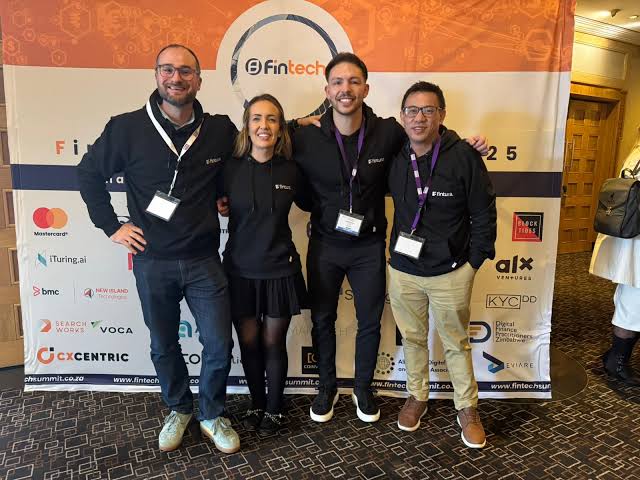South African fintech startup, Fintura, is making waves in the accounting industry with an artificial intelligence (AI)-powered, all-in-one platform designed specifically for accountants in emerging markets.
The company says it is tackling one of the sector’s most persistent challenges: the fragmentation of accounting software.
At the heart of this effort are co-founders Bernice Christine Houy and Reece Bailey, two professionals who share one vision: to simplify accounting and reshape how firms across Africa work.
Together, Bernice Christine Houy and Reece Bailey are building Fintura not just software, but what they believe could be the future of accounting in emerging markets.
Meet Bernice Christine Houy
Bernice Christine Houy is the co-founder and CEO of Fintura. Before launching Fintura, Houy founded and ran Xena Accounting, a Cape Town-based firm that serviced clients worldwide.
Houy’s career also includes senior finance roles, such as Chief Financial Officer at Solutions For Africa and finance committee member at The Justice Desk, where she managed audits, financial reporting, and funder compliance.
Earlier, she trained as an accountant at Fenns Incorporated while completing her articles with SAICA (South African Institute of Chartered Accountants).
Houy graduated from the University of South Africa. Armed with qualifications from Milpark Education and regulatory exams through Moonstone Business School of Excellence, Houy channels her expertise into designing Fintura’s product roadmap.
Meet Reece Bailey
Reece Bailey, Fintura’s co-founder and Chief Revenue Officer has spent his career at the intersection of technology, recruitment, and growth strategy.
Before joining Fintura, Bailey was Owner and Director of Vital Consulting Recruitment Limited in the U.K., a firm focused on sourcing talent in smart buildings, IoT, and sustainability.
His earlier roles included leading business management systems recruitment at Insight IT & Engineering Recruitment and developing accounts at PHMG, a global audio branding company.
With a Bachelor of Arts in Business, Management, and Marketing from Manchester Metropolitan University, Bailey brings a commercial mindset sharpened by working in competitive global markets.
His strength lies in building partnerships, driving adoption, and ensuring Fintura’s AI-powered platform reaches the accounting firms that need it most.
Building Fintura for Accountants
Since launching Fintura, the pair have grown the platform rapidly. For both founders, the mission is to build an integrated, AI-powered platform that frees African accountants from administrative overload and positions them as strategic advisors in the businesses they serve.
“We bring nine key functions – practice management, company statutory, taxation, payroll, bookkeeping, financial statements, management reporting, audit management, and workforce suite, our core HR module – into one integrated system,” explained Reece Bailey.
Bailey added that the platform also features an AI assistant, Hank, which automates up to 85% of routine administrative work.
According to the team, Hank connects directly with South Africa’s CIPC (Companies and Intellectual Property Commission) and SARS (South African Revenue Service), enabling accountants to manage compliance and execute end-to-end tasks without switching between systems.
“Most accountants in Africa use a patchwork of tools – none of which talk to each other or connect directly with local regulators. This causes inefficiency, missed deadlines, compliance penalties and lost billable hours,” the startup’s CEO and qualified accountant Bernice Christine Houy said.
Fintura’s competitive edge, according to its founders, lies in localisation and integration. Rather than competing with global players such as Xero, Sage, or SimplePay, the platform integrates with them, adding compliance-focused workflows and AI-driven automation tailored to African markets.
Expansion Beyond South Africa
While Fintura is currently focused on South Africa, demand from Kenya and Ghana is already growing.
“Our expansion strategy is to enter fast-digitising African markets where compliance localisation is a barrier for global tools. In each market, we’ll integrate directly with local compliance systems to deliver a fully end-to-end accounting experience,” Bailey explained.
The startup’s momentum was further boosted when it was named winner of this year’s South African Startup World Cup, securing a spot at the global final in San Francisco where it will compete for a potential $1 million investment.
Fintura operates on a subscription model, offering both per-organisation and per-client pricing, allowing firms to start small and scale as needed. In just four months, it says it has onboarded over 15 accounting firms, which have collectively brought more than 1,500 clients onto the platform.
What This Means
As digitisation accelerates across Africa, experts believe platforms like Fintura are emerging as crucial tools in modernising financial services.
By combining artificial intelligence with direct integration into regulatory systems, industry leaders say the startup is addressing pain points that global solutions often overlook, particularly around compliance and localisation.
Data supports the growing case for AI adoption in finance. Reports show that companies implementing AI automation in accounts payable processes have achieved cost reductions of up to 30% within the first year of deployment.
This kind of efficiency gain demonstrates the impact automation can deliver. Analysts argue that if Fintura’s model continues to scale, it could play a defining role in reshaping how accountants across emerging markets operate.





